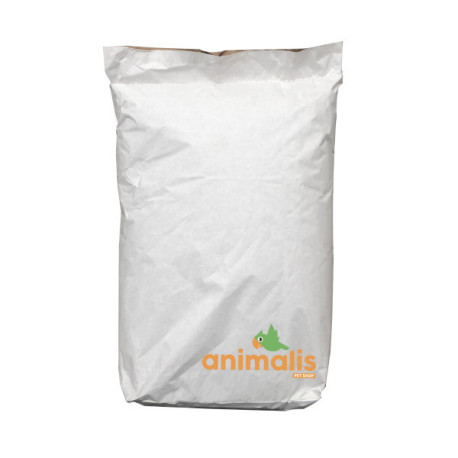- New






Reference: NAVETTE-25KG
The turnipseed is quite similar to rapeseed, with the difference being the more bitter flavour of the latter. Turnipseed is rich in protein and beneficial for enhancing singing, making it particularly interesting during the breeding season for canaries. However, as this seed is quite fatty, we recommend not exceeding 10% of your mix with turnipseed for colour canaries or posture canaries. For song canaries, turnipseed softens the song and can therefore be used at 30% of the mix: in this latter case, we recommend accompanying your bird's diet with liver support.
The rapeseed is almost similar to the canola seed, with the difference being the more bitter flavour of the latter. Rapeseed is rich in protein and beneficial for enhancing singing, making it particularly interesting during the breeding period for canaries. However, as this seed is quite fatty, we advise not to exceed 10% rapeseed in your mix for colour canaries or posture canaries. For singing canaries, rapeseed softens the song and can therefore be used at 30% of the mix: in this case, we recommend accompanying your bird's diet with liver support.
Buckwheat is a nutritious seed often included in the diet of cage and aviary birds.
- Appearance: Buckwheat is a triangular seed, light brown to greyish in colour, with a slightly rough shell.
Benefits for Birds:
- Balanced Nutrition: Buckwheat offers a combination of proteins, carbohydrates, and fibres, contributing to a balanced diet.
- Energy: The complex carbohydrates provide a sustainable source of energy for the birds' daily activities.
- Digestive System: The fibres promote good digestion and a healthy intestinal regulation.
- Proteins: The proteins in buckwheat support growth, reproduction, and the maintenance of muscle mass in birds.
Thanks to its small black or pretty electric blue seeds, the poppy is recognizable among thousands. A cousin of the poppy, the poppy is known for its content of good fats and micronutrients essential for the proper functioning of the body.
Oatmeal or peeled oats are used in the composition of the basic mixtures of canaries and hooked beaks especially during the breeding and feeding period.
Its protein level is quite low, but it is a seed rich in energy.
Crude protein: 13%
Fat: 8%
Carbohydrates: 68%
Phosphorus: 0.4%
Calcium: 0.09%
Carrot seeds are very rich in vitamins with a high proportion of vitamin A and carotene, as well as vitamin B, calcium and valuable carbohydrates.
Hemp seeds are very nutritious and contain more essential fatty acids (EFAs) than any other source, and are second only to soybeans in their richness in highly digestible proteins of high biological value. They are particularly recommended during breeding periods to stimulate the reproductive instinct of birds.
The flaxseed consists of 40 to 45% oil and 25% protein. Flaxseed preserves very well. It contains, in particular, two fatty acids with similar names (both derived from the word "lin"), linolenic acid (an omega-3) and linoleic acid.
The seed is used in animal feed, particularly for laying hens for which an increase in the omega-3 content of the eggs is desired.
Due to these properties, this seed aids digestion.
Chenopodium quinoa is an annual plant, one to two meters tall or more. The central stem is cylindrical at the collar and becomes more angular higher. It can be unique or have many ramifications, with a diameter ranging from one to eight centimeters and a height of 0.5 to 3 m, depending on the varieties and growing conditions such as seeding density or fertilization9. Its color is also very variable: uniformly green, green with purple or red streaks, or uniformly red.
The wild rose is a wild rose bush whose rose hips are consumed in autumn and are very rich in vitamin C.
Chicory seeds (cichorium intybus) are among the health seeds that come from wild plants. These seeds are rich in fiber and minerals and allow intestinal balance.
They purify the body and are also effective in case of indigestion.
Seeds for canaries and exotic and native birds.
They have the property of binding to minerals such as calcium, iron and zinc and making them less bioavailable.
These seeds rich in lipids and proteins are especially appreciated by wild birds. They will attract sizerins, reeds, goldfinches, black-headed chickadees, sparrows, sad doves and a host of other birds to your garden. It is often used as a replacement for the more expensive shuttle.
Niger seed is a bird seed rich in phosphorus and calcium.
Niger seeds (or nyjer seeds) are fine seeds rich in oil.
They come from Guizotia abyssinica (also called Oleiferous Guizotia).
Niger is very popular with most birds, goldfinches and tarins love it.
Niger is one of the few bird seeds with a good calcium/phosphorus ratio.
Niger, birdseed rich in phosphorus and calcium. Niger seeds (or nyjer seeds) are fine seeds rich in oil. They come from Guizotia abyssinica (also known as Guizotia oleiferous). The niger is highly prized by most birds, goldfinches and siskins love it.
The seed is mainly grown in India, Burma, Ethiopia and Nepal. Niger is an oilseed with a high fat content (38-43%) and protein content (23%). It provides quality food for all species of wild and forest birds, both in dry and sprouted form.
Niger is one of the few birdseeds with a good ratio of calcium to phosphorus.

The turnipseed is quite similar to rapeseed, with the difference being the more bitter flavour of the latter. Turnipseed is rich in protein and beneficial for enhancing singing, making it particularly interesting during the breeding season for canaries. However, as this seed is quite fatty, we recommend not exceeding 10% of your mix with turnipseed for colour canaries or posture canaries. For song canaries, turnipseed softens the song and can therefore be used at 30% of the mix: in this latter case, we recommend accompanying your bird's diet with liver support.
